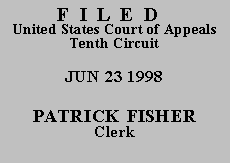 UNITED STATES COURT OF APPEALS
UNITED STATES COURT OF APPEALS
 UNITED STATES COURT OF APPEALS
UNITED STATES COURT OF APPEALS
TENTH CIRCUIT
| UNITED STATES OF AMERICA, | |
| v. | No. 97-3282 |
| KENNITH D. MOBERLY, | (D.C. No. 92-10095-01)
(D. Kan.) |
ORDER AND JUDGMENT(*)
Before BALDOCK, EBEL, and MURPHY, Circuit Judges.(**)
Defendant Kennith D. Moberly seeks a certificate of appealability to appeal the district court's decision denying his 28 U.S.C. § 2255 motion to vacate, set aside, or correct his sentence.(1) We exercise jurisdiction pursuant to 28 U.S.C. §§ 2253 and 2255. Concluding Defendant has made no substantial showing of the denial of a constitutional right, we deny his application for a certificate of appealability and dismiss the appeal.
Defendant is an inmate at the Federal Correctional Institution in El Reno, Oklahoma where he is serving consecutive 60 month sentences for, inter alia, using or carrying a firearm during the commission of a felony in violation of 18 U.S.C. § 924(c). Subsequent to entering his guilty plea, the United States Supreme Court adopted a narrow construction of § 924(c)'s "use" prong in Bailey v. United States, 516 U.S. 137 (1995). Relying on Bailey, Defendant filed a motion pursuant to 28 U.S.C. § 2255 seeking to vacate his sentence on the grounds that the facts to which he pled guilty no longer amounted to a crime.
The district court's task of evaluating Defendant's § 2255 motion was hampered because no transcript of the plea hearing existed. Therefore, the district court conducted an evidentiary hearing, at which Defendant and several additional witnesses testified, to determine whether Defendant freely and voluntarily pled guilty to facts supporting a § 924(c) conviction. After considering the witnesses' testimony, facts within the presentence report to which Defendant did not object and the indictment, the district court concluded that Defendant did not meet his burden of proving that his plea was involuntary or that there was no factual basis for the plea. Accordingly, the district court denied Defendant's § 2255 motion.
Advised by his counsel that the district court's decision left no non-frivolous grounds for appeal, Defendant insisted on filing this appeal. Counsel, therefore, filed a brief pursuant to Anders v. California, 386 U.S. 738 (1967), and requests that we allow him to withdraw. Responding to the Anders brief, Defendant argues that the district court erroneously found that he "carried a firearm in relation to a drug trafficking offense," and that the court's finding deprived him of his rights to due process and equal protection under the law.(2)
We have reviewed Defendant's application for a certificate of appealability, his brief, counsel's Anders brief, the district court's order, and the entire record before us. We conclude that Petitioner has not demonstrated that the district court's disposition of his § 2255 petition is debatable, reasonably subject to a different outcome on appeal, or otherwise deserving of further proceedings. See Barefoot v. Estelle, 463 U.S. 880, 893 & n. 4 (1983) (substantial showing of denial of constitutional right shown by demonstrating that: (1) issues raised are debatable among jurists, (2) an appellate court could resolve issues differently, or (3) the questions deserve further proceedings.). Accordingly, we DENY Petitioner's motion for a certificate of appealability and DISMISS his appeal. Counsel's motion to withdraw pursuant to Anders is GRANTED.
Entered for the Court,
Bobby R. Baldock
Circuit Judge
*. This order and judgment is not binding precedent, except under the doctrines of law of the case, res judicata, and collateral estoppel. The court generally disfavors the citation of orders and judgments; nevertheless, an order and judgment may be cited under the terms and conditions of 10th Cir. R. 36.3.
**. After examining the briefs and appellate record, this panel has determined unanimously to honor the parties' request for a decision on the briefs without oral argument. See Fed. R. App. P. 34(f); 10th Cir. R. 34.1.9. The case is therefore ordered submitted without oral argument.
1. Defendant's "Motion for Leave to Proceed Pro Se and Leave for Extension of Time to File a Petition for Certificate of Appealability and Opening Brief" is granted.
2. The government argues that because Defendant did not timely file his notice of appeal as required by Fed. R. App. P. 4(a)(1), we have no jurisdiction over this appeal. The deadline for Defendant to file his notice of appeal was September 15, 1997. On September 17, 1997, two days after this deadline, Defendant filed a motion pursuant to Fed. R. App. P. 4(a)(5) to extend the time for filing his notice of appeal. Defendant filed his notice of appeal on September 19, 1997. The district court granted Defendant's motion later that day. Thus, Defendant's appeal was timely filed and we may proceed to the merits. Cf. Hinton v. City of Elwood, 997 F.2d 774, 777-779 (10th Cir. 1993).